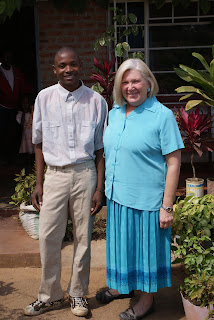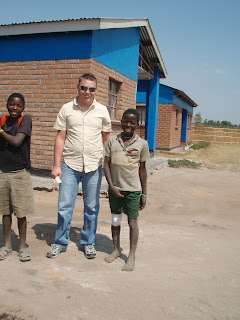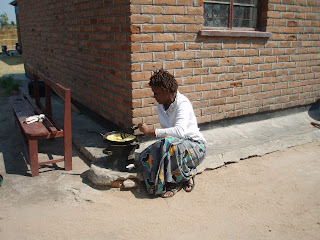
We didn't leave Friday afternoon for Dzuwa as Jose was feeling a little under the weather. He was much better by Saturday morning, so we left very early, arriving in Dzuwa at ~ 9 AM. Ronald was going to meet us in Santhe, where the tarmac ends, but the battery in his car was 'flat', so Jose got to drive on his memory of the roads. Ronald walked and met us a little under half way, but Jose did great getting to that point. There are no road signs.. you just have to remember which way to turn when the road forks... by watching villages and trees, etc. It was just as well that we had not spent the night to start an early clinic, since an 8 month old child had died and the funeral was held Saturday. We had to check with the big chief, Chief Dzuwa, if we could still hold the clinic. He said yes, so we started at about 10 AM. Many of the patients had come from surrounding villages to attend the funeral, so did not have their health passports, which makes taking care of them even a greater challenge. The clinic was set up in a school room. I had McDonald, one of the missionary / teachers / agricultural guys as my interpreter. Jose and Ron Chimzimu were the pharmacy techs. It really worked well. Of course, we had no lab tests, only a scanty history, a BP cuff, a stethoscope, a flashlight, a otoscope (for ears), my hands and our brains (which struggle with some of the African symptoms!). We took a 30 minute lunch break, and then worked until it was almost dark (no lights, so we are have to stop at dusk.) I saw a couple of really ugly rashes on children, lots of upper respiratory illnesses, stomach pains, arthritis (they work hard, dig in fields, carry water and firewood, walk or ride bikes everywhere - their joints are destroyed..), lots of chest pain - most related to arthritis or stomach, some high BP and palpations, diarrhea, bilharizia (the water borne disease that affects your bladder - very common here), some malaria. One child that I think has seizures - probably some partial complex seizure - but we did not see one so it was hard to get a good handle on it. Lots of eye problems - some allergy, but also old traumatic injuries and probable cataracts. A common complaint is 'pain everywhere'. Some yeast infections (you always worry about their HIV status when they complain of yeast infections). Tooth pain and multiple caries was fairly common. We gave out tons of paracetamol (like Tylenol) and Ibuprofen, lots of antibiotics, some BP and heart meds (inc. aspirin daily for the older patients). We ran out of the 'stomach meds' (Prilosec and cimetidine). Dispensed the medications for bilharzia and malaria, along with meds for yeast. Some cough medication. We had one wound that needed to be dressed, and of course the kids with the ugly rashes... it is very frustrating to realize that, for the chronic problems, if we happen to hit the 'right medication' for them, once it is gone, they will once again be in the same situation. Ron and his Joy to the World ministries is trying very hard to have their clinic up and running. Many of these people had never seen a doctor. The closest facility is 44 km - the Santhe hospital - and it is small and doesn't have many resources. Several of the children looked malnourished and wormy, we had multiple vitamins and worm meds to give out, too. All in all, we did pretty well. Ron and Jose were awesome pharmacists, with Ron translating the instructions. After we closed the clinic for the day, we went to Ron and Ulema's house for dinner - Ron asked Jose to take him into Santhe to buy gas for the generator, so Ulema and I had a nice visit. She educated me on some of the eating habits. Their diet is mostly nsima (ground maize flour that is cooked in water, sort of tastes like grits, with a firmer consistency), lots of greens and beans and occasionally fish or chicken. That is a pretty healthy (but low protein) diet, so I couldn't figure out why so many people complained of abdominal pain. Turns out the women often go into the bush to get the greens (inc. okra of which there are multiple kinds growing wild). They cook it with bicarbonate of soda - which is hard to get in villages and very expensive, so they make a substitute using wood ashes and water. For those of who are not aware of this, that makes LYE (like, Drano lye). No WONDER they all had belly aches! I wish I had known ahead of time, I could have talked to them about changing their diet. I also found out that although their village, Dzuwa, has a nice deep borehole (well) that has been tested and found free of contaminates, neighboring villages are still drinking from shallow wells (or the standing water in areas) that are contaminated... those people really suffer from diarrhea and bilharzia. They could come and get water from the borehole, but it is a long trip on foot, so they often chose the contaminated water. The children pretty much run free and play in the dirt (I mean, lie in it, roll in it, etc.).. they also eat a seed pod from a local tree.... mainly to fill their bellies - and I watched them as they rolled in the dirt with this 'food', then promptly put it in their mouths. It is evident why worms are such a huge issue! Between the patients we saw at the clinic, those at Ulema's house, and few that straggled by this morning before we left, we saw over 80 people. I just hope we made a few of them better! The pictures are of Jose and Ronald at the pharmacy, Jose mixing some pediatric medicine and myself examining an unhappy child, with McDonald in the foreground.


















































